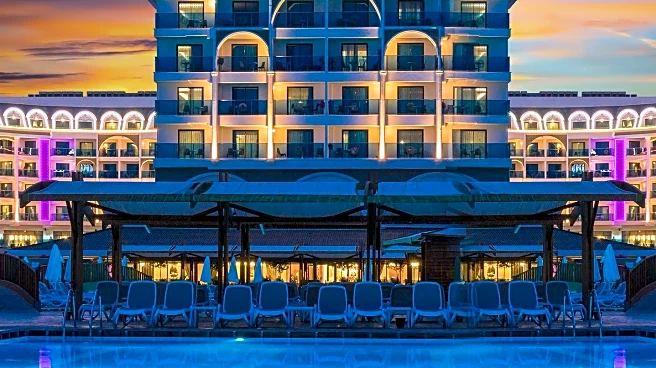What's Happening?
Luxury hotels are increasingly offering sleep tourism experiences as a response to the growing sleep epidemic in the United States. This trend involves providing guests with opportunities to sleep outdoors,
which can help reset their circadian rhythms. The concept is gaining popularity, with experts predicting the industry could grow by 8% by 2028. In the U.S., nearly 40% of adults report insufficient sleep, leading to health issues such as heart disease and obesity. Hotels like Amangiri in Utah offer unique experiences such as outdoor beds with open-sky terraces, allowing guests to fall asleep under the stars and wake up to natural sunlight. This approach is supported by research indicating that sleeping in nature can quickly adjust the body's internal clock, improving sleep hygiene.
Why It's Important?
The rise of sleep tourism highlights the significant impact of sleep deprivation on public health in the U.S. With a large portion of the population suffering from insufficient sleep, there are widespread implications for health care costs and productivity. By promoting natural sleep environments, luxury hotels are tapping into a lucrative market while potentially offering a solution to a pervasive health issue. This trend could lead to increased awareness and investment in sleep health, benefiting both the hospitality industry and public health initiatives. As more people seek out these experiences, there may be a shift towards prioritizing sleep in wellness and travel sectors.
What's Next?
As sleep tourism continues to grow, more hotels are likely to adopt similar offerings, expanding the market and increasing competition. This could lead to innovations in sleep-related services and amenities, such as personalized sleep environments and advanced sleep technology. Additionally, there may be increased collaboration between the hospitality industry and health experts to further validate and enhance the benefits of sleep tourism. Stakeholders in the travel and wellness industries will likely monitor consumer demand and adjust their strategies accordingly to capitalize on this trend.
Beyond the Headlines
The emphasis on sleep tourism may also spark broader discussions about the role of natural environments in health and wellness. This could lead to increased interest in eco-friendly travel and sustainable tourism practices. Furthermore, the trend may encourage individuals to reconsider their daily exposure to artificial light and its effects on sleep, potentially influencing lifestyle changes beyond travel experiences.









